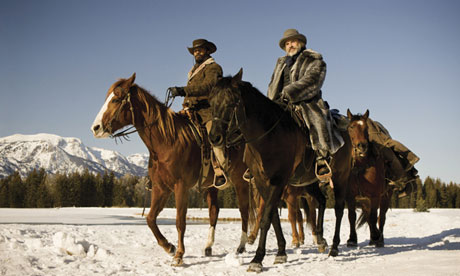
Jamie Foxx and Christopher Waltz in Django Unchained. Photograph: Allstar/The Weinstein Company/Sportsphoto Ltd
What's "the filthiest, dirtiest, nastiest word in the English language"? According to one of the prosecutors in the OJ Simpson trial, there was no question. It's what many still dare refer to only as "the n-word". Deputy district attorney Christopher Darden submitted that learning that adetective had uttered this six-letter abomination would strip the jury of their judicial faculties.
Elsewhere, courts have ruled that letting slip this word is as understandable a provocation to violence as dealing a physical blow. Libraries and bookshops have purged their shelves of volumes such as Joseph Conrad's The Nigger of the Narcissus. The Adventures of Huckleberry Finn, in which the word appears 213 times, has been banned from many schools; to overcome this problem, a new edition was published last year with the offending word changed to "slave" throughout.
In 2007, New York's city council unanimously passed a resolution banning the use of the word "nigger" within the five boroughs(theoretically, at least). That same year, giving voice to the lexeme was enough to get 19-year-old Emily Parr thrown out of the Big Brother house.
Against this background, the appearance of a major film in which it is to be heard more than 100 times was bound to provoke comment. Quentin Tarantino, the director of Django Unchained, maintains that the word has to be "part and parcel" of a truthful representation of life in the antebellum south. Still, he managed to intrude it 38 times even into Jackie Brown. Spike Lee thinks he's "infatuated" with it. Be that as it may, Tarantino's latest film invites a reappraisal of this oath's standing.
In Nigger: The Strange Career of a Troublesome Word, Harvard professor Randall Kennedy sees his subject as "the nuclear bomb of racial epithets", a weapon that's been used to wound and degrade black people for three centuries. Some of those who still view it that way continue to want it banned completely from both public and private discourse.
Yet the response to Django Unchained has been surprisingly mild. Some people suggest that the film's forthright vocabulary may even serve to enhance race relations.
The comedian Lenny Bruce shared Tarantino's infatuation. Julian Barry's Oscar-nominated screenplay for his biographical film, Lenny, has him justifying it thus: "It's the suppression of the word that gives it the power, the violence, the viciousness. If President Kennedy would just go on television and say … 'Nigger, nigger, nigger, nigger, nigger' to every nigger he saw … till nigger didn't mean anything any more, then you could never make some six-year-old black kid cry because somebody called him a nigger at school."
Others have argued that sheer repetition is the way to defang the word. In the Death of Civil Rights and the Reign of Hip-Hop, professor Todd Boyd of UCLA writes: "To me, hip-hop has redefined the word … The more you say it, the more you desensitise it." Certainly, anyone shocked during the opening scenes of Django Unchained would surely find it just too exhausting to sustain their indignation through the next two and a half hours.
Not everyone accepts that over-exposure is sufficient to destroy evil: some argue that "nigger" is too robust to be so easily disposed of.Rapper Ashley Walters renounced his own infatuation with the word after hearing from a child victim of playground bullies. There are also those who believe the the removal of the taboo would trivialise the legacy of racial oppression.
Other hate-labels have been eliminated successfully through a recognisable cycle of decontamination. First, the target-group reclaims the insult and starts flaunting it as a badge of collective pride. After a time-lag, this usage seeps through to the general population. As this happens, the word in question is gradually drained of its malign potency. Having lost its point, it then disappears completely, liberating its former victims for ever from a once-effective instrument of abuse.
The word "queer" has been through this process. No replacement has emerged. "Dyke" seems to be going the same way, as perhaps are "wop" and "dago", while "crip", "bitch" and "slut" might be embarking on the same journey.
There's no doubt that "nigger" is well into stage one of this progression. A few maintain that its widespread use among black people reflects only self-hatred, or internalisation of white-racism of the kind displayed bySamuel L Jackson's "house nigger" in Django Unchained. However, this is patent nonsense. The word is clearly used frequently as a term of both endearment and empowerment, as when Django himself insists that he's one of those "one in 10,000 niggers" who won't be kept down.
As yet, the leap into the mouths of the well-meaning wider community has yet to occur. In 1993, a white basketball coach at Central Michigan University heard his African-American players using the word "nigger" to commend each other on an effective manoeuvre. He asked their permission to use the word in the same way; when they gave it, he did. His reward was censure by his superiors, sensitivity training, two campus protests and eventually dismissal.
Still, things may be changing. Last month, a white Staffordshire man was charged with racially aggravated threatening, abusive or insulting behaviour for shouting "nigger" at a black man. When he told magistrates he was a rap music fan expressing affection, he was acquitted.
Samuel L Jackson showed his own desire to see the word coming out of white mouths in an interview to promote Django Unchained. "There's been a lot of controversy surrounding the usage of the n-word in this movie," began Fox Houston's film critic Jake Hamilton. Jackson interrupted. "No? Nobody? None? The word would be … ?" he inquired. He then refused to answer the question until his interlocutor was prepared to pronounce the profanity.
Even so, Fox's finest still bottled it. Clearly, there is some distance to go on the yearned-for path to perdition. Perhaps Django Unchained will help things on their way.
No comments:
Post a Comment